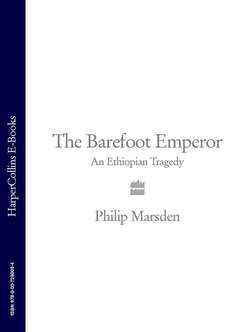Читать книгу The Barefoot Emperor: An Ethiopian Tragedy - Philip Marsden - Страница 32
Оглавление18
Ten months later, Tewodros was sitting in a small recess in one of Gondar’s ancient palaces. Around him was the scatter of vellum and parchment, the nap of leather-bound books. Behind him rose a tall, glassless window. Below was the palace compound and the walls, and beyond that the town and the tents of his army and in the distance, streaked by early sun, stretched the plains, green and fertile after the rainy season. It was early on the morning of 28 September 1863, and the wild celebrations of Mesqel, the Feast of the Finding of the True Cross, were over. The great pyres had all burnt down. The city dozed.
Tewodros did not doze. He had summoned the Europeans to a meeting. Out of the half-darkness of the palace interior came Consul Cameron in his blue diplomatic uniform. He had returned, as had Monsieur Bardel, the French envoy. A number of the missionaries were with them – Theophilus Waldmeier and Reverend Henry Stern, who had been trying to convert the Falashas, the Ethiopian Jews. They all arranged themselves at the emperor’s feet, on a semi-circle of rugs.
While waiting for a reply to his letters to European capitals, Tewodros had been attacked by the Egyptians. Musa Pasha had looted Metemma, burned Dunkur, marched on Wehni. Tewodros’s hold on the lowlands was destroyed, his native Qwara overrun. He had done nothing. During his visit, Cameron had convinced the emperor that European support was too great a prize to risk with an impulsive attack. Tewodros waited for a reply to the letters.
Yet by June not one response had come back. When Cameron returned to Ethiopia just before the rains, he was empty-handed.
‘Your Majesty,’ he promised, ‘I will give my head if after two months the answer to your letter is not here.’
Tewodros was already angry with Cameron. He had not taken Tewodros’s letter himself, but sent it to London by a messenger. He then went off to travel through the eastern Sudan, the very lands that the Egyptians had overrun.
A couple of months later, Tewodros received better news. A response had arrived from the French, and he had now called the Europeans to hear it read out. He turned to M. Bardel and asked him about his mission – Bardel, who at least had had the courtesy to go to Paris.
‘Your Majesty, I met with a most uncourteous reception at the court of France.’
‘Did they provide you with a house, food and all you required?’
‘No, Jan Hoi. I got neither a house to dwell in, nor food, nor money to supply my daily wants.’
‘What did the emperor tell you when you presented my letter?’
‘He dismissed me with the sarcastic sentence, “I will have no direct intercourse with a sovereign who cuts off the hands and feet of his subjects.”’
Several things were at once clear to the others listening. Bardel and Tewodros had rehearsed this exchange, Bardel was making it up – he had never had an audience with Napoleon III – and Tewodros was struggling to control an unholy rage.
He told Consul Cameron to read out the letter from the French. It was not even from Napoleon, but from the Minister of Foreign Affairs, M. Drouyn de Lhuys, dated 23 March 1863. Just as the British government had through Plowden, the French urged Tewodros’s protection of Catholic missionaries: ‘all those governments worthy of calling themselves civilised have adopted the principle of freedom of belief’.
Like the British too, the French found it necessary to lecture Tewodros on his war plans. ‘Before going to war against powerful neighbours, it is as well to take note of their forces, and to guard against losing any advantage already acquired in rushing into such a hazardous undertaking.’
Tewodros had placed great faith in the Christian powers of Europe. This is what came back. The more he saw of Europeans, the more disappointed he was. In their world there seemed no clarity of alliance – Christian and Muslim fought on the same side. Privately the French envoy said one thing to him, the British another; when he asked for their support in defending himself, they said the same thing: don’t. He had taken a personal dislike to the two envoys, Bardel and Cameron. ‘The Frenchman is a madman, the Englishman an ass,’ he was reported as saying. The individuals now sitting at his feet were not, in his eyes, of the calibre of loyal John Bell or Walter Plowden.
He snatched the paper from Cameron’s hand. ‘Is this an answer to my letter? Napoleon may think himself great, but I am greater still. His genealogy is only of yesterday, mine I trace back to David and Solomon!’
Each of those sitting before the emperor, watching his anger, realised that something had changed. They had come to Ethiopia for their own reasons – duty, vocation, adventure. Many now decided that the time had come to leave. Those who did not looked back to that morning in the old palace at Gondar and remembered the sight of the raging Tewodros, and realised it had been their last chance.
